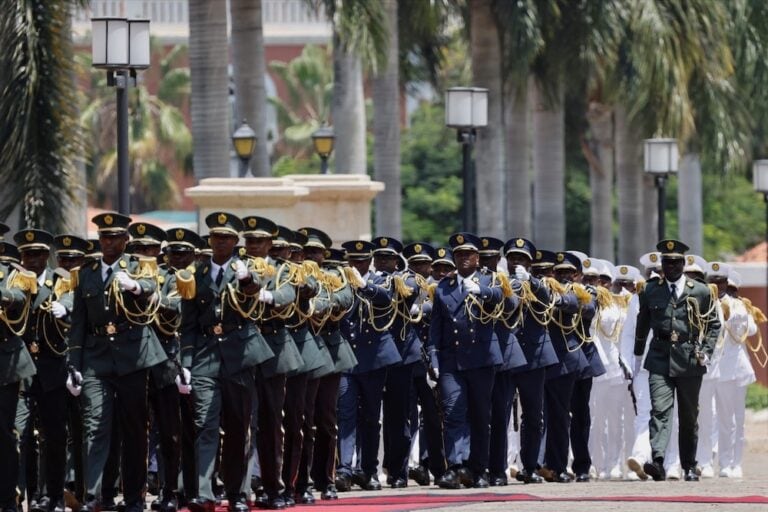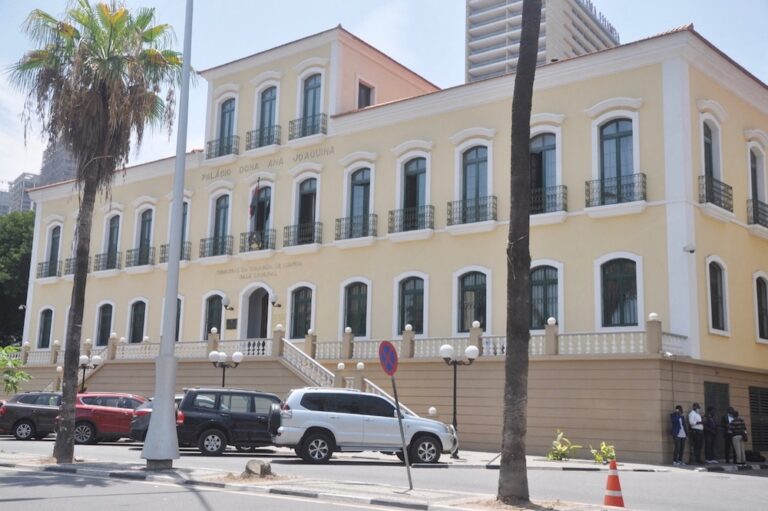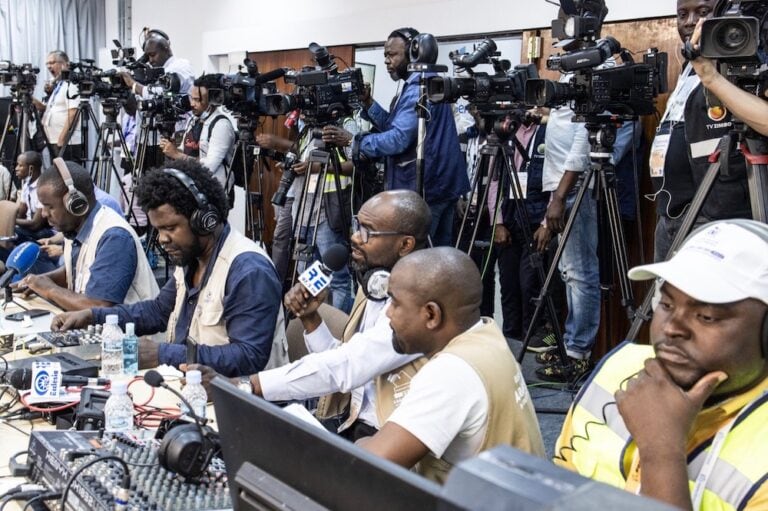(MISA/IFEX) – MISA has confirmed that “Folha 8” editor William Tonet was released on bail of 2.2 billion Kwanzas Reajustados (US$500) by the police’s Criminal Investigation Department (DNIC) on 4 October 1999. Tonet embarked on a hunger strike shortly after his arrest in the early hours of 2 October for “speculation and fiscal evasion”. **Updates […]
(MISA/IFEX) – MISA has confirmed that “Folha 8” editor William Tonet was
released on bail of 2.2 billion Kwanzas Reajustados (US$500) by the police’s
Criminal Investigation Department (DNIC) on 4 October 1999. Tonet embarked
on a hunger strike shortly after his arrest in the early hours of 2 October
for “speculation and fiscal evasion”.
**Updates IFEX alerts of 4 October, 16 and 14 September, 17, 13, 11 and 10
August 1999**
Even though the legal officer in charge agreed to release Tonet a mere four
hours after his arrest on 4 October, the order could not be executed as the
offices were closed on the weekend. According to Tonet, “they wanted to hold
me in jail until Monday and arranged everything to happen over the weekend.”
On Monday 4 October, Tonet spent the day in prison as his release order was
signed only at the end of the day. The officer on duty informed Tonet’s wife
that the attorney had gone to a funeral. He was finally released at 9 p.m.
(local time) that evening.
Speaking to Jorge Silva from MISA-Angola, Tonet said the legal officer at
the police’s Economic Crimes Unit had issued a warrant of arrest for him and
his custom-clearing agents “to confirm and give details about the process of
payment of fiscal obligations” involving a container imported by Tonet’s
company, Mundovideo. Tonet expressed fear for the future following his
release.
“Anything can happen. They want me dead and if they fail to incriminate me
the next target can be my life,” he said.
Tonet reiterated that his detention was part of the political pressure he
and other independent media face. Tonet revealed that during the week of 26
September, he had to appear at DNIC’s Selective Crimes Section for five
consecutive days to respond to a questionnaire of seventy-four questions
about his personal life and political affiliations in addition to other
“inadmissible and offensive questions”. He added, “They [the police] asked
how much I received from [Jonas] Savimbi [leader of the UNITA rebel
movement] to publish UNITA statements.” Other questions were in connection
with articles appearing in “Folha 8”, particularly the story about the 9
August raid on Radio Ecclesia.
In other information received by MISA, Victor de Carvalho, the chief editor
of “Folha 8”, was interrogated at the Selective Crimes Section of the DNIC
on Friday 17 September, also in connection with the Radio Ecclesia article.
Carvalho said he was called in to confirm his participation in the story and
was asked to reveal the sources of information and photos published by
“Folha 8”. He told the police that he could not be held accountable for
Radio Ecclesia’s actions and refused to reveal the sources.
During the week of 5 September, the director of the independent weekly
“Agora”, Aguiar dos Santos, was summoned to the DNIC offices on four
separate days to answer questions about articles published in the paper.
Following several rounds of interrogation, Dos Santos said he was not clear
about why he had been called in, as the questioning was general. However,
some of the questions were related to a special issue of “Agora” which was
published at the end of August to mark the twentieth anniversary of
President Eduardo dos Santos’ term in office. The special issue contained
two contentious articles. One was a report and commentary on President Dos
Santos’ achievements, the other was a reprint of an article from the French
newspaper “Libération” about the philanthropic foundation set up in the
president’s name, FESA. Other questioning from the DNIC concerned an article
published by “Agora” on the state of health of UNITA rebel leader Savimbi.
On Monday 4 October, members of the police’s Economic Crimes Unit visited
the offices of “Agora” with a warrant saying that wanted to examine the
financial records of the paper. However, they left shortly afterwards
because the editor was not in. They returned on 5 October and proceeded to
examine the financial records. The officers informed the editor that the
investigation was routine and that they were investigating several other
businesses that same day.
On 29 September 1999, four journalists from the state-owned news agency
ANGOP were suspended indefinitely “for clarifications” about their ties with
independent newspapers. Editor Antonio Picarra, sports editor Silva Candembo
and reporter Antonio Campos were suspended for their alleged collaboration
with independent “Agora”, “Angolense” and “Folha 8”, respectively. The
fourth journalist affected, Manuel Borges, ANGOP’s
correspondent in Bie province, was accused of also being a correspondent for
the Portuguese news agency LUSA.
A note issued by ANGOP Director General Miguel de Carvalho said that the
journalists had been suspended because they acted as “unauthorised”
correspondents for other media. De Carvalho, who is also the secretary
general of the Uniao do Jornalistas Angolanos (UJA), a journalists’
association, was quoted as saying that the journalists would be asked to
clarify their positions. It meant that they would be forced to stop writing
for the independent media or face stiff disciplinary action.
The measure will affect several other journalists from the state-run media
who write under pseudonyms to escape repression, reports Jorge Silva.
Journalists in the state media are subject to severe censorship which
prevents them from reporting or commenting on “sensitive issues”, including
the civil war, corruption, abuse of power, human rights violations and
maladministration.
Journalists with the state media are very poorly paid. In most cases a
second job – which is common practice at present – is not only a means to
increase income, but also serves as an effective way of exposing issues
which will never be carried by their own media. Most of them report
“clandestinely” under pseudonyms for fear of political victimisation.
Background Information
The latest information brings to thirty-three the number of Angolan
journalists who have been physically attacked, threatened with death,
detained or subjected to DNIC interrogation since January because of reports
they have written or broadcast. At least one journalist, Mauricio Cristovao,
was murdered in what remain mysterious circumstances.
As editor of “Folha 8”, Tonet has borne the brunt of the DNIC’s harassment
of the media. Since April he has been hauled before the DNIC no less than
nine times, including his latest detention. On 12 September, Tonet had his
passport confiscated, effectively preventing him from traveling outside the
country. Tonet’s latest encounter with the DNIC was the longest he had been
held in custody so far.
Recommended Action
Send appeals to authorities:
Angola, amid the recent statements and assurances by Attorney General
Domingos Culolo recognising the value and benefit of the press
Angola, it is clear that the DNIC is waging a campaign of repression against
independent journalists and specifically harassing them for exercising their
rights to freedom of expression and media freedom
Constitution
media both physically and psychologically through threats of criminal
charges, detentions and interrogations.
Angolan press law which states that “nobody can suffer prejudice in his/her
private, social and professional life by virtue of having exercised the
legitimate right to express freely his/her ideas through the press”
since the beginning of the year to establish whether the agency has been
operating within its legal parametres
excesses committed by the DNIC against independent journalists, and to
ensure that the police are not a hindrance to the people in the exercising
of their fundamental rights
full effect to citizen’s rights and to ensure legal protection and redress
in the event of any rights violation
motion
the process of establishing a Constitutional Court which will give true
effect to the noble rights and freedoms contained in the Angolan
Constitution, and ensure that human rights are not arbitrarily violated, as
seems to be the case in Angola these days
expressed recently by the attorney general and to allow him to carry through
on his assurances to the Union of Journalists (SJA)
Appeals To
Hon Jose Eduardo dos Santos
President of the People’s Republic of Angola
Fax: +244 2 392 733/ 391 476/ 331 898Mr Hendrick Vaal Neto
Minister of Information
Fax: +244 2 343 495Hon Mr Fernando Dias dos Santos
Commander in Chief of Police
Minister of Home Affairs
Fax: +244 2 331731Mr Paulo Tjipilka
Minister of Justice
Fax: +244 2 338175
Please copy appeals to the source if possible.


